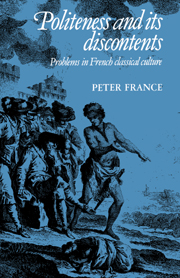Book contents
- Frontmatter
- Contents
- Acknowledgements
- Introduction
- PART I EXCESS AND UNREASON
- PART II ENLIGHTENED SOCIABILITY
- 4 Polish, police, polis
- 5 The sociable essayist: Addison and Marivaux
- 6 The commerce of the self
- 7 The writer as performer
- 8 Beyond politeness? Speakers and audience at the Convention Nationale
- PART III CONFRONTING THE OTHER
- Notes
- Index
- Cambridge Studies in French
6 - The commerce of the self
Published online by Cambridge University Press: 20 October 2009
- Frontmatter
- Contents
- Acknowledgements
- Introduction
- PART I EXCESS AND UNREASON
- PART II ENLIGHTENED SOCIABILITY
- 4 Polish, police, polis
- 5 The sociable essayist: Addison and Marivaux
- 6 The commerce of the self
- 7 The writer as performer
- 8 Beyond politeness? Speakers and audience at the Convention Nationale
- PART III CONFRONTING THE OTHER
- Notes
- Index
- Cambridge Studies in French
Summary
At a certain moment in Nathalie Sarraute's novel Les Fruits d'or, a fairly typical moment from this writer's work, we see a male character trying to deal with an unexpected challenge. The passage goes like this:
Et voilà que la masse inerte en face de lui se met à remuer, se souléve: ‘Mais dites-moi, qu'est-ce que ça peut bien vous faire, au fond, tout ça?’
L';énorme remous l'entraîne, il roule, perdant pied. Il se débat comme un insecte qu'un souffle a renversé et qui bat l'air de ses petites pattes affolées, cherchantà se raccrocher … ‘Mais … mais comment … comment qu'est-ce que ça me fait?’
The extravagantly metaphorical rendering of the disarray provoked by a sudden question is one example of Sarraute's exploration of the hidden continents of self. She is working here in the modern line of Dostoevsky, James Joyce and Virginia Woolf, for one of the dominant features of modern fiction (alongside the interrogation of the very conditions of representation) is the ever more penetrating representation of the inner self. But at the same time, the reader is made aware, here as elsewhere in Sarraute, of the way in which, however feebly, this devastated self attempts to face the world, to ‘se raccrocher’, to present itself to others, to find a successful strategy for survival and success.
- Type
- Chapter
- Information
- Politeness and its DiscontentsProblems in French Classical Culture, pp. 97 - 112Publisher: Cambridge University PressPrint publication year: 1992



